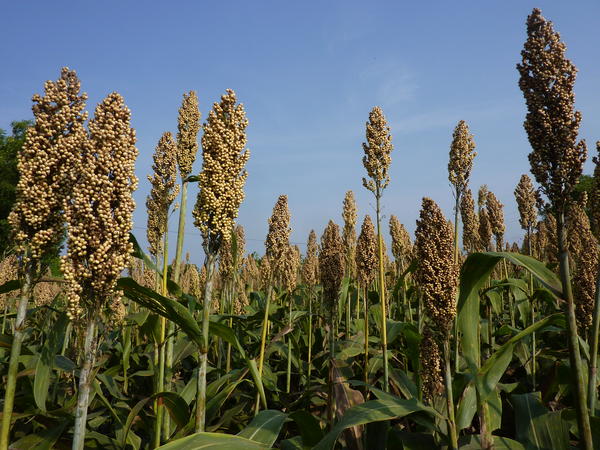
The Sunday News

HOUSEHOLD food security in most arid and semi-arid areas is under threat due to the adverse shortage of small grains seed in the country as maize cropping is unlikely to yield a meaningful harvest owing to the imminent drought this season.
Small grains (sorghum, rapoko, finger millet) are ranked second as staple cereal crop after maize in Zimbabwe. They play a vital role in food and nutrition security. Their drought tolerant nature make them able to thrive better in marginal areas for thus being an answer to grain security in this current environment of climate change and variability. The marginal areas of Zimbabwe (natural regions III, IV and V) are characterised by high temperatures (above normal), limited and uneven distributed rainfall.
Farmers in drought prone areas of Masvingo, parts of Midlands and Matabeleland North and South provinces that are dependent on rain-fed cropping are unlikely to realise any meaningful yields due to the forecasted very low rains this season.
As such farmers are encouraged to shift their attention from cropping maize, to drought tolerant small grains like sorghum, millet and rapoko.
The Department of Agricultural Technical and Extension Services (Agritex) Matabeleland South provincial officer, Mr Judiya Ncube, said the shortage of small grains seed comes at a time when it is most needed with climatic predictions by the Southern African Regional Climate Outlook Forum of normal to below normal rainfall season clearly spelling disaster for the country’s agricultural season.
“Availability of small grains seed is still a problem as you will realise that most seed retailers have more of maize seed varieties compared to sorghum and pearl millet thus it just goes to show that their supply is unstable at a time we are staring at drought.
“Some farmers are using selected small grain seed from last season’s harvest while some are buying it from the open market and obviously such seed isn’t reliable. The other issue is the pricing whereby a 50 kilogramme of sorghum seed cost $38 to $40, such a price is unrealistic for most communal farmers,” Mr Ncube said.
He said although there are programmes such as Government’s input distribution scheme targeting vulnerable households and Food and Agriculture Organisation’s funded drought mitigation programme that are unveiling small grains seed, the aid was not enough.
“Obviously we have some programmes looking at the distribution of small grains seed such as Government’s inputs scheme but its insufficient suggesting that it is also failing to source the seed.
“We also got the FAO funded drought mitigation which deals mostly with distribution of livestock feed but also has included the distribution of small grains seed in Gwanda, Matobo and Mangwe,” Mr Ncube said.
He said despite poor climatic conditions in the province about 80 percent of the area was cropping maize.
“Encouraging small grains cropping is our main focus and thrust extension-wise. Obviously our region is dry and small grains are drought tolerant but we still have more areas growing maize and we are saying we have to change our mindsets but of course that change won’t be sudden,” Mr Ncube said.
Matabeleland North Agritex provincial officer Mr Dumisani Nyoni said small grains seed shortage were a result of deliberate lack of interest by seed houses to produce them.
“Small grains are open pollinated varieties so the seed houses are only keen to produce hybrid varieties, which are mostly maize, the reason being that one can grow open pollinated varieties three to four seasons and will still be assured of a good yield and to seed houses producing them doesn’t make business sense,” Mr Nyoni said.
He said only two districts namely Bubi and Nkayi are facing severe small grains seed shortage while in other districts the situation was better.
“Tsholotsho and Hwange have small grains seed through their small seed multiplication groups and are meeting 60 to 70 percent of their requirements. Hwange also has about seven tonnes accessed under the Presidential Input Scheme being distributed as we speak,” Mr Nyoni said.
He said as part of their extension services, Agritex was advising farmers to form small grains seed production groups and linking them to research stations for the provision of foundation seed so as to improve availability.
“In the near future we need these farmers groups to be registered to produce certified small grains seed. Tsholotsho farmers are already producing small grains seed and most of it is the one which is being given to Government by seed houses to distribute under its inputs distribution programme. The seed houses only willow the seed and apply chemicals to them,” Mr Nyoni said.
He said due to the prevailing weather conditions farmers might end up buying genetically poor small grains seeds and hamper their anticipated yields.
The Deputy Minister of Agriculture, Mechanisation and Irrigation Development (crop production and irrigation development), Davis Marapira said there was sizeable availability of small grains seed but hinted that to improve agricultural or crop produce production on long term, the Government was channelling more resources towards the development of irrigation schemes throughout the country targeting mostly drought prone areas.
“We have a sizeable amount of small grains seed but not enough to cover all provinces. Of course in distributing the seed we will prioritise areas such as Masvingo, Midlands and Matabeleleland North and South provinces, which are dry and have relatively low annual rainfall,” he said.



